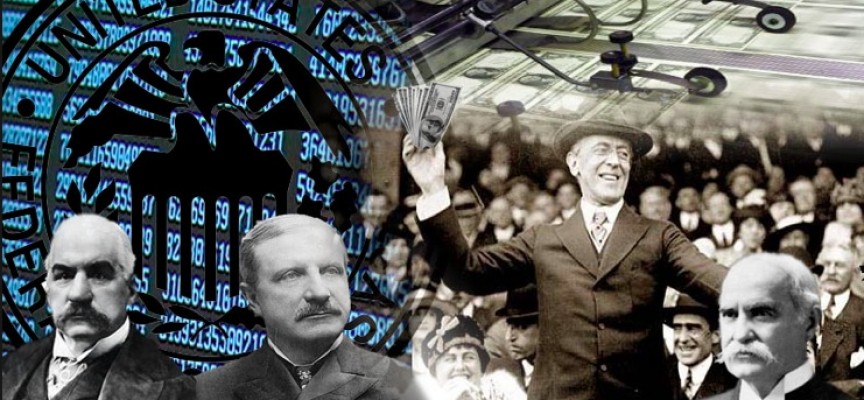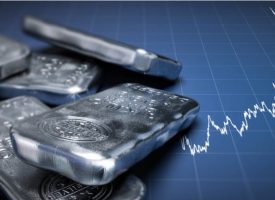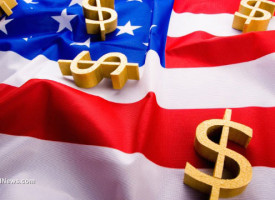This piece is a must read for anyone who is worried about the endgame.
By Bill Fleckenstein President Of Fleckenstein Capital
May 11 (King World News) – Overnight markets were uneventful and through midday here the indices lost a little less than 0.5% after yesterday’s surprising ramp job to the upside. In the afternoon the market slipped more and closed on the lows, off by 1%-ish. Yesterday’s rally looks particularly odd and the market now feels exhausted to me. If so, shorts may start to work better, though I only added a little bit today…
To hear which company Eric Sprott, James Turk and George Soros invested in that is advancing the digital payments revolution and makes it possible for you to spend gold with a prepaid-card globally click on the logo:
Away from stocks, green paper took a breather today, oil rallied 3.5%, fixed income was higher, and the metals bounced, with silver gaining 1.5% to gold’s 1%.
 It’s So Crazy, It Seems Likes It’s Working
It’s So Crazy, It Seems Likes It’s Working
Continuing along yesterday’s vein of macro thoughts on the lunacy of central banks, many people have asked me what I think QE4 (or whatever we want to call the Fed’s next easing program) might look like. That is, will it be NIRP, more monetization, or both? I don’t have the answer to that question, but what is clear is that as central bankers keep pursuing radical policies that are more and more outlandish, the more they seem like logical, consistent — and therefore good — ideas by the masses. Nothing could be further from the truth, but when you are in the midst of a craze, whether you want to call it a bubble or the mass delusion of thinking that central bank monetization is a proper course of action and only leads to positive results, insanity becomes sanity, and vice versa.
I noted on March 23 that I had seen articles where pundits who believe in these sorts of policies were floating trial balloons for even more aggressive monetization combined with expanded budget deficits (nicknamed “cold fusion”) as the next step to protect us all from “deflation.” Anyone paying attention to the headlines can see that such ideas have gotten more traction, though there hasn’t really been talk about implementation, but only because events haven’t become dire enough yet.
Similarly, I have been asked about what the endgame is for the central banks. It has seemed for some time now that they will never willingly leave ZIRP or NIRP (witness how difficult it has been for the Fed to move rates up by a measly 25 basis points after eight years of massive monetization). Thus the endgame becomes an interesting intellectual thought process. Scott Bessent (former CIO of Soros Fund Management who branched out on his own this last year) stated at the most recent Grant’s Conference in mid-April that he thought the Japanese might be the first central bank to write off the government debt that it owns. And in the present mindset, that almost sounds like a sensible policy. It is possible they wouldn’t simply write it off, but rather swap it for 200- or 300-year paper yielding 10 basis points or something else functionally just as worthless, but the net effect would essentially be the same. If a central bank was going to try something like that I suspect the Japanese would be the most likely, since they are the furthest down the path of out-of-control monetization.
 Now You Owe It, Now You Don’t
Now You Owe It, Now You Don’t
What I haven’t seen yet is much of a discussion on this topic of debt forgiveness or restructuring. However, a friend forwarded a recent article by Jefferies economist David Zervos advocating that very policy. (For those who don’t know, Zervos seems to understand that in the end these policies will produce problems, but in the meantime he has ridden the SPOOs nearly perfectly. Will he get out in time? Who knows.) I want to share a few paragraphs in which he explains how this nutty theory would be put into practice:
“But what if these tools are not enough? What if inflation and growth do not respond to the stimulus? What if the debt/GDP ratio cannot be pushed back to a sustainable level that allows the economy to grow? Then I would argue we step into the final phase of the unconventional monetary policy experiment — helicopter money. Milton Friedman first proposed it in 1969, and Ben Bernanke brought it into the modern day discussion in 2003. The idea of course would not be to drop 10,000 Yen notes across the rice fields of Japan. Rather, the idea would be for the central bank to buy up a significant portion of the government debt and simply dispose of it. Central bank debt extinguishment is helicopter money.
“The central bank balance sheet is of course left technically insolvent. And while this may bother some folks optically, there is actually no loss or recapitalization necessary. A central bank can have a negative net worth for decades or frankly forever. There are no shareholder revolts. There is no default. All payments are made, and all creditors are made whole. Of course without a large asset base at the central bank, draining reserves, paying interest on reserves, and conducting traditional monetary policy becomes quite complicated. However, the central bank always controls reserve requirements, so in theory they can still tighten without any assets on the balance sheet.
“The idea of debt disposal via the central bank balance sheet may sound far fetched at first glance, but I can imagine a younger generation that will increasingly warm up to the idea!! In fact, in many ways the central banks have already dropped the money. It’s in the system. We all however look at the debt on the central bank balance sheet as something the private sector must pay back. We look at it through a Ricardian lens — and thus it is a drag on economic activity. If the debt is extinguished, the Ricardian dark clouds that have been holding back the private sector are lifted. And the incentives to consume and invest in the private sector are once again restored.
“As a final thought experiment just imagine that by 2018 the BoJ has a balance sheet that is 2 times GDP (today it’s about 0.8). And suppose it decided to extinguish that debt leaving only a 50% debt to GDP ratio. Remember all holders of JGBs have been paid. There is no default. The central [bank] has simply replaced the debt with currency through QE. What happens to the Nikkei, JGBs and the Yen? And what happens to consumption, investment and inflation? I think it’s a wonderful thought experiment. My guess is the Nikkei rises, JGB yields rise and the Yen weakens. Furthermore, consumption and investment rise along with inflation. The question is only one of central bank stability. Can they control the INCREDIBLE reflationary power of helicopter money? That is the hardest part of the experiment. And to be sure, there is certainly plenty of room for error.”
So there you have it: the perceived “painless” way out of the economic disaster created by the central banks, led by the Fed. To be sure, I don’t think tightening is something any of these central banks will ever willingly do, even when inflation finally ratchets up (despite the fact that the statistics are set up to scrub out higher prices). They will rationalize inflation as something that is needed to make up for the “lack” of inflation in the past. Of course, this is all complete nonsense. As yesterday’s column pointed out, most people are experiencing much higher inflation than what the Fed thinks it wants, but that is yesterday’s topic.
This Will Be On the Final
In the end, at some point bond markets will revolt against these policies, but until they do expect more and more extreme versions along the lines of this discussion to be considered. Until the bond markets finally discipline central bank professors, stock markets may rally on these ideas (as they have in the past), but the better asset class will of course be precious metals.
Included below are three questions and answers from the Q&A’s with Bill Fleckenstein.
Bonus Q&A
Question: Bravo to Arnott! He hits the nail on the head. He also explains much of the anger of the middle class, imo!
Answer from Fleck: “Yes, exactly.”
Question: Fleck, not so much a question here, just a vent from a frustrated advisor. As a retail advisor, going on 25-years in business, who has a strong macro/value/GARP bias in the way I conduct my practice, its been disheartening to see about a decade of my business growth get wiped out amidst the 8-year post financial crisis central banking nonsense. I have even recently lost a small handful of clients that actually saw positive returns in 2008, that have grown tired of sticking around any longer. As this happens throughout the industry, more and more money flows to those that have been taught some incredibly bad habits and who will eventually have to un-learn pretty everything they thought they knew about “markets.” Any new advisor that has come into this business with a similar philosophical view (macro, value, GARP- driven) has pretty much been chewed-up and spit out by now. We now have an entire new generation of advisors that are mostly momentum, chart watching, trend chasers that couldn’t read a financial statement if their life depended on it; and who have also learned that markets never correct more than 10-12% and if they do, the Fed will save them.
Answer from Fleck: “Yes, the next bear market in equity — which is looming, if not well underway already — will crush a lot of wannabe money managers.”
This Could Make The Price Of Mining Shares Go Berserk!
Question: Hi Fleck, after quoting JPMorgan as saying “Gold is looking more and more attractive every single day,” Zero Hedge commented: “It is refreshing to see that in a world in which over $7 trillion in bonds have a negative yield, someone has done the math. It is less refreshing that gold is once again so prominently featured in the official narrative, because if cash has recently become a target in a global NIRP world, that means that gold, whose wealth preservation qualities are vastly greater, will surely undergo an Executive Order 6102 redux in the coming years as governments around the globe seek to eliminate access to hard assets.”
Do you think there’s a serious threat of a “6102 redux,” and what will happen to minors if that happens? Thanks
KWN note: Executive Order 6102 was Roosevelt’s presidential executive order signed on April 5, 1933 “forbidding the hoarding of gold coin, gold bullion, and gold certificates within the continental United States.” The effect of the order, in conjunction with the statute under which it was issued, was to criminalize the possession of monetary gold by any individual, partnership, association or corporation.
Answer from Fleck: “No, I don’t. But if it were to happen in some country, minors won’t be impacted but miners could go berserk. Nothing like the fear of confiscation to drive prices higher.”
***To subscribe to Bill Fleckenstein’s fascinating Daily Thoughts CLICK HERE.
***KWN has now released the extraordinary audio interview with Bill Fleckenstein and you can access it by CLICKING HERE OR ON THE IMAGE BELOW.
***Also just released 2nd Longest Bull Market Of All-Time And An Epic Global Bond Bubble, But What About Commodities? CLICK HERE.
© 2015 by King World News®. All Rights Reserved. This material may not be published, broadcast, rewritten, or redistributed. However, linking directly to the articles is permitted and encouraged.










